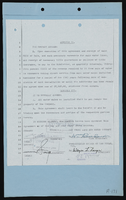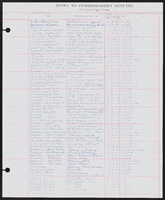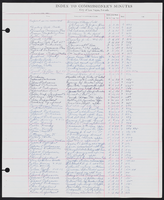Search the Special Collections and Archives Portal
Search Results
Baton Rouge, Louisiana Family Diary
Identifier
Abstract
The Baton Rouge, Louisiana Family Diary (1848-1860) is a single item that contains personal accounts, diary entries, as well as handwritten and newspaper recipes, in different hands, by approximately three individuals. The first diary section begins in 1848 and mostly contains personal religious reflections and meditations on church sermons and activities. The second set of diary entries cover the years 1858 through 1860 and concerns farming, crops, and general accounts. The farm was located in the Baton Rouge, Louisiana area and its primary crops were cotton, sugar cane, and corn. The third section of diary entries contain pages of handwritten recipes and some clipped from a local Baton Rouge newspaper. All the diarists are unidentified, but it was likely kept within a single family.
Archival Collection
Washington Mormon Temple
Authority Link
No description.
Latitude/Longitude
Feature
Geographic Location
Richard A. Leigon oral history interview
Identifier
Abstract
Oral history interview with Richard A. Leigon conducted by Claytee D. White and Stefani Evans on January 12, 2017 for the Building Las Vegas Oral History Project. Leigon discusses John S. Park Elementary School, John C. Fremont Junior High School, and Boy Scout Troop 69 at Griffith Methodist Church. Leigon also discusses his father’s, Ralph A. Leigon, contributions to Las Vegas, Nevada, the International Brotherhood of Electrical Workers (IBEW), the American Federation of Labor and Congress of Industrial Organizations (AFL-CIO), and his own lengthy career with IBEW that bridged labor management.
Archival Collection
Stella and Claude Parson oral history interview
Identifier
Abstract
Oral history interview with Stella and Claude Parson conducted by Emily Powers on February 26, 1977 for the Ralph Roske Oral History Project on Early Las Vegas. Stella and Claude Parson both discuss black history, discrimination in Reno, Nevada and Las Vegas, Nevada, and opportunities for African Americans in Nevada. Stella Parson discusses being the first African American student to graduate from University of Nevada, Reno. Claude Parson discusses his involvement in United States Air Force, living on Nellis Air Force Base, and being a minister in his church.
Archival Collection
Nel Downing oral history interview
Identifier
Abstract
Oral history interview with Nel Downing conducted by Scottie Rector in the 1970s for the Ralph Roske Oral History Project on Early Las Vegas. Downing first talks about the first properties in the Downtown Las Vegas, Nevada area before talking about the forms of transportation available in Las Vegas. She also talks about her work with the Clark County Housing Authority, the development of Henderson, some of the early churches, and the beginnings of gambling in Henderson. She then discusses gambling, life in Nevada, the Helldorado parade, and inflation over time.
Archival Collection
Mission San Juan Capistrano
Authority Link
No description.
Latitude/Longitude
Feature
Geographic Location




